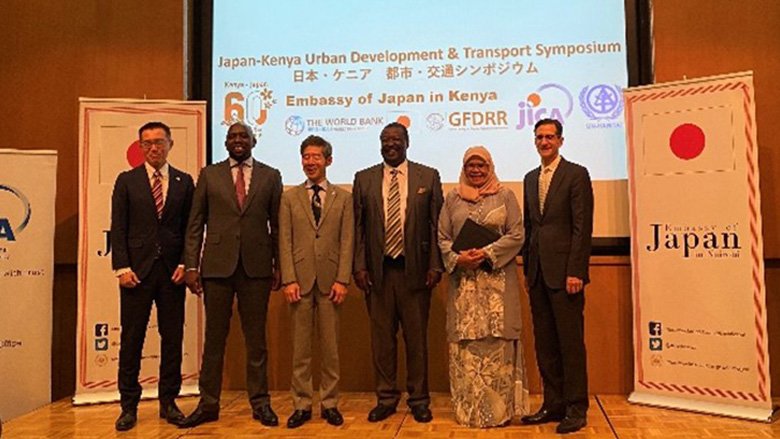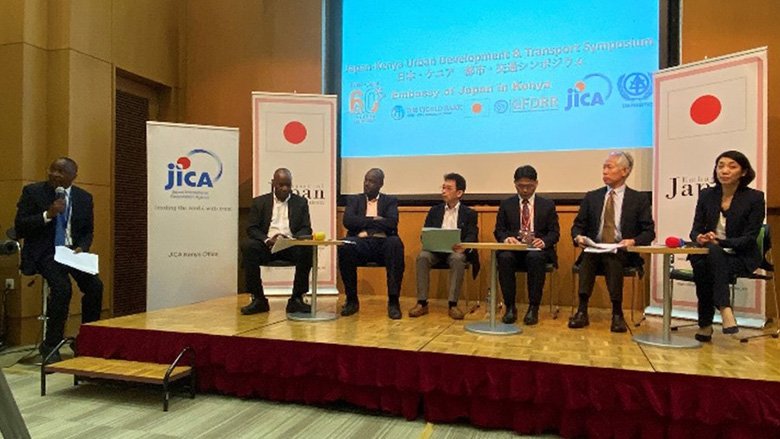2023 marks the 60th anniversary of the establishment of diplomatic relations between Japan and Kenya. To commemorate this milestone and further strengthen relations between the two countries, the Embassy of Japan in Kenya, jointly with the GFDRR Japan-World Bank Program for Mainstreaming Disaster Risk Management in Developing Countries (the Japan Program), the World Bank, and the Japan International Cooperation Agency (JICA), organized the Japan-Kenya Urban Development & Transport Symposium on January 24, 2023.
The following themes were covered during the Symposium: (i) Japan’s cooperation on urban development and transport in Kenya; (ii) Japan’s support of the Resilient Commuter Rail System in the Nairobi Metropolitan Area (NMA); and (iii) Private Sector Management of Japanese Expressway Infrastructure and Public Transport System.
In this Symposium, high-level officials from the Government of Kenya (GoK) and international development partners delivered opening remarks and the Hon. Onesimus Kipchumba Murkomen, Cabinet Secretary for Roads and Transport, gave a keynote speech on the status and future of urban development and transport in Kenya. Subsequently, Japanese experts shared their experiences and knowledge on urban development and transport and discussed future collaborations with Kenyan stakeholders.
Keith E. Hansen, Country Director of the World Bank in Kenya, Rwanda, Somalia, and Uganda, in his opening remarks, addressed the participants, stating:
The Japan Program and the Tokyo Disaster Risk Management Hub have become a critical part of the Bank’s resilience agenda over the years. They are now needed more than ever to meet ever increasing needs for furthering resilience to natural hazards and climate related disasters by mainstreaming disaster risk management into urban development, specifically, roads and public transport among others. The Tokyo Disaster Risk Management Hub is playing a critical role in connecting Japanese knowledge and experience to help meet the needs of our clients like the GoK. Today, with their great support and through the grant received from the Japan Program, we were able to invite Japanese Railway experts to join us and share their vast experience in innovative resilient urban development and transport with an eye toward strengthening the GoK’s efforts to improve its urban mobility.
Akiko Kishiue, Senior Urban Transport Specialist from the World Bank in Kenya, spoke about the importance of improving urban mobility services for better urban access to advance economic and social development as well as enhancing DRM associated with the proposed rehabilitation and modernization of a commuter railway system and selected railway areas in the Nairobi Metropolitan Area, which are planned under the proposed World Bank-financed Kenya Urban Mobility Improvement Project.
Furthermore, Japanese experts shared their experience and knowledge from the transport sector. For example, an expert from one of the largest private railway companies in Japan, highlighted how they developed its railway lines, including sharing how they collaborated to help develop suburb areas around transit stations using the Japanese urban planning principle, the Transit-Oriented Development (TOD) approach, emphasizing that urban rail development and urban development (e.g., station areas) should be considered one strategy, and how the TOD structure can be adapted to post-COVID lifestyle changes.
In the panel discussion, Japanese experts, the GoK, and a lecturer from the University of Nairobi mainly discussed issues of traffic congestion and management in NMA, how to improve the current situation of commuter railway services, and national policies and plans on transport and land use. The importance of the TOD in NMA was also emphasized while recognizing it requires a substantial investment.
The Japan Program and the World Bank will continue to support the GoK to promote urban development and enhance the resilience of public transport systems and critical infrastructure across Kenya in collaboration with the Embassy of Japan in Kenya, JICA, and other international development partners.

